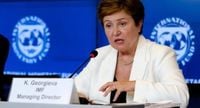As the world’s financial leaders prepare to gather in Washington for the annual meetings of the International Monetary Fund (IMF) and World Bank next week, a stark warning has echoed across global markets: "Buckle up," IMF Managing Director Kristalina Georgieva declared on October 8, 2025, "uncertainty is the new normal and it is here to stay." According to coverage from ABC, AP, and Al Jazeera, Georgieva’s message comes at a moment when the global economy is performing better than many had dared to hope—but with storm clouds gathering on the horizon.
Georgieva’s remarks, delivered at the Milken Institute in Washington, highlighted both resilience and risk. Despite a barrage of shocks—including President Donald Trump’s sweeping tariffs, geopolitical tensions, and a volatile policy environment—the IMF chief noted that the world economy has so far managed to avoid the worst-case scenarios. "The global economy is proving more resilient than expected despite major shocks such as President Donald Trump’s sweeping tariffs, but this strength may not last," she cautioned, as reported by AP.
One of the most striking signals of investor anxiety came on the same day, when gold prices soared to a record $4,000 an ounce. This historic rally, reported by Al Jazeera, reflects mounting concerns over a weakening US dollar, escalating geopolitical tensions, and uncertainty about the direction of monetary policy. The surge in gold is not just a blip; it’s a symptom of deeper unease. "Just look at the surging global demand for gold," Georgieva urged. "Global resilience has not yet been fully tested. And there are worrying signs the test may come."
At the heart of the current uncertainty lies the United States’ aggressive use of tariffs. Since April 2025, Trump’s administration has imposed import taxes on nearly all major US trading partners—including Canada, Mexico, Brazil, China, and even smaller economies such as Lesotho. In a candid moment during a meeting with Canadian Prime Minister Mark Carney, Trump quipped, "We’re the king of being screwed by tariffs." While the US has announced new trade frameworks with countries like the United Kingdom and Vietnam, the ripple effects of these tariffs are being felt worldwide.
Georgieva warned that the "full effect is still to unfold." While decisive policy responses and private sector adaptability have helped cushion the blow so far, she noted that US margin compression could soon "give way to more price pass-through, raising inflation with implications for monetary policy and growth." The IMF currently forecasts global growth at 3% for 2025, a slight slowdown from 3.3% in 2024, but still a sign of relative strength. Yet, as Georgieva underscored, "history tells us this sentiment can turn abruptly."
Adding another layer of complexity, the US Supreme Court is set to hear arguments in November over whether Trump has the authority to impose certain tariffs under the International Emergency Economic Powers Act. The outcome could shape the trajectory of US trade policy for years to come, and finance ministers and central bankers are bracing for the potential fallout.
But it’s not just trade and markets that are raising red flags. Georgieva’s speech also touched on social and demographic pressures bubbling up around the world. "The young are taking their disappointment to the streets from Lima to Rabat, from Paris to Nairobi, from Kathmandu to Jakarta—all are demanding better opportunities," she observed, as quoted by AP and Al Jazeera. In the United States, she noted, "the chances of growing up to earn more than your parents keeps falling—and here too, discontent has been evident." This frustration, she argued, has contributed to a "policy revolution" that is reshaping trade, immigration, and international frameworks.
To address these challenges, Georgieva called for a range of structural reforms. In Asia, she advocated for greater internal trade; in Africa, more business-friendly policies; and in Europe, a renewed push for competitiveness and market integration. For the United States, the focus was squarely on fiscal discipline. The numbers are staggering: according to the US Treasury Department, federal debt has ballooned from $380 billion in 1925 to an eye-watering $37.64 trillion in 2025. And the Congressional Budget Office estimated in July that Trump’s new tax and spending law would add another $3.4 trillion by 2034. Georgieva urged US policymakers to "tackle its spiralling public sector deficit" and encourage household savings.
Financial markets, meanwhile, have remained buoyant—at least for now. US stock valuations have soared, buoyed by optimism about future productivity gains from generative artificial intelligence and the meteoric rise of tech giants like Nvidia and Tesla. Georgieva drew a parallel to the dotcom bubble of the late 1990s, warning that "today’s valuations are heading toward levels we saw during the bullishness about the internet 25 years ago." If a sharp correction were to occur, she cautioned, "tighter financial conditions could drag down world growth, expose vulnerabilities, and make life especially tough for developing countries."
China, too, came in for some "tough love" from the IMF chief. She urged Beijing to implement reforms to spur growth and boost household spending, noting that "private savings are chronically high." For Europe, Georgieva called on leaders to move beyond "lofty rhetoric" and appoint a "single market tsar" to accelerate integration—removing border frictions and building a true energy union and financial system.
All these warnings come as the IMF, a 191-country institution dedicated to fostering global financial stability and reducing poverty, prepares to update its economic outlook. Policymakers face a delicate balancing act: supporting growth and stability in the face of persistent shocks, while addressing the underlying vulnerabilities that could turn today’s resilience into tomorrow’s crisis.
As the world tunes in to next week’s meetings in Washington, one thing is clear: the sense of uncertainty is real, and the stakes could hardly be higher. Investors, policymakers, and ordinary citizens alike are watching closely, hoping that the resilience of the past year is not just a prelude to greater turbulence ahead.



